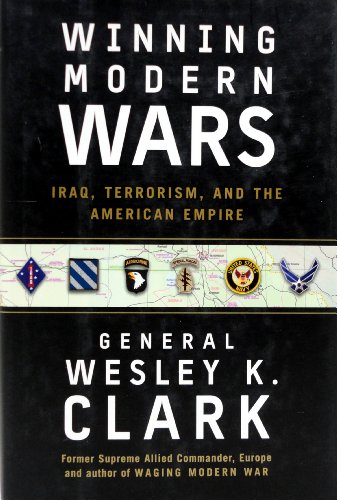Winning Modern Wars
Iraq, Terrorism And The American Empire
Wesley Clark
BOOK REVIEW

In the aftermath of 9/11, the world witnessed a seismic shift in global politics, and among the key voices that emerged from the chaos was General Wesley Clark. His incisive analysis in Winning Modern Wars: Iraq, Terrorism and the American Empire doesn't merely recount a sequence of events; it serves as a gripping eulogy for a certain notion of American power. It's a rallying cry, a challenge, and a cautionary tale all rolled into one.
Clark draws from his extensive military background, navigating through the fog of war and delving deep into the complexities of the American military's role in Iraq and the broader implications of the War on Terror. This isn't just a soldier's account; it's an urgent plea to recognize the transformative, and often destructive, impact of modern warfare. The book interweaves personal experiences with grave insights, making you confront unsettling truths about the motives and repercussions behind military actions. Are these campaigns truly to spread liberty, or are they veiled attempts of imperialism?
The emotional weight of Clark's writing hits the reader hard. His words resonate like a battle cry, exposing the raw wounds of loss and the haunting specter of conflict. "What is the cost of freedom?" he seems to ask, imploring readers to scrutinize the price paid by soldiers, civilians, and societies in the wake of decisions made in the name of security. This is not mere rhetoric. The echoes of his queries linger in the air, forcing a deep, introspective assessment of our collective conscience.
One cannot overlook the intense emotions sparked in readers and critics alike. While many praise Clark for his candidness and historical rigor, some dissenting voices argue that he occasionally veers into the territory of conspiracy and politicization. Yet, is it not a testament to the potency of his narrative that it inspires such fervent debate? Those who connect with his experience often do so profoundly, feeling that this book doesn't just recount history; it shapes it.
Winning Modern Wars insists we confront the often-glossed-over narratives of collateral damage and moral ambiguity. Clark's account compels you to look beyond the headlines, into the human stories behind the statistics. The tears shed by mothers losing sons, the lives irrevocably altered by violence-these aren't mere footnotes. They are central to understanding the true costs of modern warfare.
As we delve into Clark's analysis, it becomes evident that this is not just a historical account; it's a living document that resonates with contemporary issues of foreign policy and military ethics. The specter of Iraq looms large in discussions about Syria, Afghanistan, and beyond. The conversations surrounding this book stretch far beyond its pages, influencing a new generation of scholars, military strategists, and everyday citizens who grapple with the realities of war in the 21st century.
For those who may be skeptical of a military man critiquing warfare, Clark's insights provoke a much-needed reevaluation. His perspective forces readers-especially those vested in American exceptionalism-to question long-held beliefs. They might even emerge with a refreshed outlook on the endless power struggles that shape our world.
In effect, Winning Modern Wars doesn't merely stand as a chronicle; it ignites a wildfire of thought, compelling you to plunge into the discussion about America's role on the world stage. Your allegiance to ideologies may be tested. Your emotions may churn. But if you allow this book to wash over you, it guarantees that you won't emerge unchanged.
This is what great literature-especially one that faces harsh historical truths-demands of its readers: an unflinching engagement with the uncomfortable. This book is an invitation not just to reflect but to act, to advocate for a world where history does not repeat its darkest chapters. So, as you contemplate the intricacies of modern warfare and the haunting legacies left behind, remember the voices of those who lived through it and consider your own stance in the ongoing saga of humanity. 🌍 Embrace the challenge.
📖 Winning Modern Wars: Iraq, Terrorism And The American Empire
✍ by Wesley Clark
🧾 240 pages
2003
#winning #modern #wars #iraq #terrorism #american #empire #wesley #clark #WesleyClark